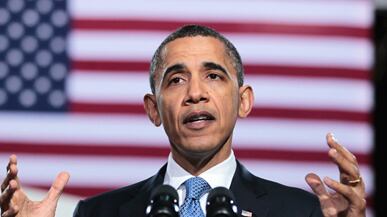With Barack Obama’s announcement that he’s running for reelection, the 2012 campaign has officially begun. I’m already bored.
The last two presidential elections were gather-your-grandchildren-around-the-rocking-chair material. 2004 was like Antietam; civil war. A few days before the election, I remember telling a conservative friend that I didn’t see how John Kerry could lose; Democrats simply wanted it too much. Acquaintances for whom liberalism had rarely meant much more than yoga class were emailing to tell me about their journeys through Pennsylvania, hunting for swing voters.
My conservative friend gave me a knowing look: “It’s that way for us, too.” He was right, which sent my yoga-goers into spasms of rage and despair. The day after Bush’s victory, one liberal posted this note on Craigslist: “I would like to fight a Bush supporter to vent my anger. If you are one, have a fiery streek [sic], please contact me so we can meet and physically fight. I would like to beat the shit out of you.”
If 2004 was Antietam, 2008—for liberals, at least—was Juneteenth. The season of our liberation, our redemption. Even many Republicans, who disliked Obama’s views, realized they were watching something jaw-dropping. It was like watching the pitcher for the team you hate pitch a perfect game.
But 2012? Wake me when it’s over. Unlike 2004, it’s not likely to offer much suspense. Barack Obama will almost certainly win because, well, incumbents usually win. In recent memory, the only incumbents who have lost reelection have had significant primary challenges: Gerald Ford in 1976, Jimmy Carter in 1980, George H.W. Bush in 1992. To find an incumbent who has lost without a major primary challenge, you have to go back to Herbert Hoover in 1932. That’s because unified parties can orchestrate a large base turnout and unified parties give presidents the freedom to move to the center, as Ronald Reagan did in 1984 on arms control, Bill Clinton did in 1996 on welfare reform, and George W. Bush did in 2004 on prescription drugs. Yes, Obama is presiding over a lousy economy, but presidents have won reelection with lousy economies before. The country was still in the Depression in 1936, and FDR won 46 out of 48 states. Reagan won 49 in 1984 when unemployment was north of 7 percent. An incumbent with a unified party can survive a recession—comfortably—if there’s some glimmer that the worst is over. None of this is particularly exciting, but it’s true.
Obama will argue that he’s prevented economic collapse and passed some useful legislation and he’ll scare people about the prospect of Tea Party government. But he’ll never evoke the passion that he did in 2008.

It’s also true that Obama has demographics on his side. Yes, he struggles with white Anglos, especially men. But there aren’t as many of them these days. In 2012, Hispanics and millennials will both be a larger share of the electorate than they were in 2008, and there’s no Republican on the horizon who can seriously challenge Obama for their allegiance. In fact, there’s no Republican on the horizon with anything like Obama’s political skills. People forget, but our president is a pretty smart, pretty articulate guy. They forgot that about Bill Clinton, too, until he got on stage with Bob Dole.
And if 2012 won’t be exciting-close like 2004, it won’t be exciting-inspiring like 2008 either. Obama will argue that he’s prevented economic collapse and passed some useful legislation and he’ll scare people about the prospect of Tea Party government. But he’ll never evoke the passion that he did in 2008. Democrats now take it for granted that we have a president who is black and not named George W. Bush. Those things don’t feel so exhilarating anymore. Two years of Obama have made it clear what a liberal president can and cannot do: He can pass a universal health-care law, just not a particularly good one; he can appoint pro-choice Supreme Court justices; he can’t close Guantanamo Bay. Once upon a time, liberals could imagine that there was no limit to what a President Obama might achieve. Now that limit is set by John Boehner.
There is, to be sure, one thing that could juice the 2008 campaign: If Sarah Palin—or some lesser-known fanatic—won the Republican nomination. A Palin candidacy would have all the energy, and dignity, of a reality-TV show. But it’s not likely to happen. The GOP leadership is too hierarchical, too buttoned-up, too cautious, too boring. Oh, well. Maybe next fall will feature some really exciting presidential campaign in Bahrain.
Peter Beinart, senior political writer for The Daily Beast, is associate professor of journalism and political science at City University of New York and a senior fellow at the New America Foundation. His new book, The Icarus Syndrome: A History of American Hubris, is now available from HarperCollins. Follow him on Twitter and Facebook.






